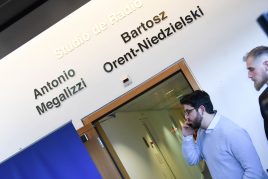COMMUNICATING EUROPE
The attack in Strasbourg on 11 December 2018 took the young and promising lives of Antonio Megalizzi and Barto Pedro Orent-Niedzielski. But the project they had devoted themselves to with intelligence and perseverance is continuing thanks to other academics who believe in European integration and in transparent and engaging information. We discussed it with Alice Plata. While the Megalizzi Foundation has been set up in Trento

There are people whose projects and dreams continue even after a bullet has frozen their blood and taken their lives. So was the dream of Antonio Megalizzi and Barto Pedro Orent-Niedzielski, respectively 29 and 35 when, almost a year ago, on 11 December 2018, in the heart of Strasbourg a rabid attacker put an end to their lives along with those of three other people, but he not annihilate their passion.
 Two of Antonio’s great passions were the radio and Europe, which the young Italian had merged into his activity for Europhonica, the radio format on the EU, created thanks to partnerships with national university networks in various countries. Antonio was appointed editor-in-chief of the Italian editorial staff and worked with a team of 25 young people, from Trento to Catania. “To come together at the European Parliament one year after those dramatic events is a great accomplishment and an expression of determination and perseverance,” Alice Plata, director of the RadUni University Radio Association, affiliated with the Europhonica project now in its fifth year, told SIR at the European Parliament in Strasbourg. The youths of Europhonica Italia have continued with their job, carried out on a voluntary basis, producing new content every day.
Two of Antonio’s great passions were the radio and Europe, which the young Italian had merged into his activity for Europhonica, the radio format on the EU, created thanks to partnerships with national university networks in various countries. Antonio was appointed editor-in-chief of the Italian editorial staff and worked with a team of 25 young people, from Trento to Catania. “To come together at the European Parliament one year after those dramatic events is a great accomplishment and an expression of determination and perseverance,” Alice Plata, director of the RadUni University Radio Association, affiliated with the Europhonica project now in its fifth year, told SIR at the European Parliament in Strasbourg. The youths of Europhonica Italia have continued with their job, carried out on a voluntary basis, producing new content every day.
The past few months were marked by “developments, especially at institutional level”, for the 2018 incident shed light on this youth initiative. Alice shared some of the highlights. At the end of May, Europhonica Italia was awarded the Charlemagne Youth Prize. “The Prize was a recognition of the work carried out by our editorial staff” that made information material easily accessible online and on social networks, even more than on the radio (access to FM radio stations in Italy can be difficult), with special praise for “Euroskills” , a column showcasing Europe’s educational and job opportunities for young people. Two projects in the framework of “Creative Europe” were presented at the end of the previous term of the European Parliament. Lobbying efforts have been made to include radio broadcasting in financial contributions from ‘”Creative Europe”, which “unlike television, music, entertainment, and even videogames, is not considered to be a performing art.” As regards the radio, “we worked in close contact with RAI – Italian Radio and Television – to refine our technical skills and knowledge through a joint project involving the production of customised videos as part of a RaiNews programme. We have also teamed up with the European Commission’s Representation in Italy on the subject of Europe and sport during the Giro d’Italia. All of these experiences have further enriched our understanding of the subject.”
 “Political” initiatives have also been taken. A legislative proposal for the “Creation of the Antonio Megalizzi Fund to promote the development and diffusion of university radio stations” was presented to the Chamber of Deputies on 11 October. “A structured system is essential for improving work capacity and training”, said Alice Plata, given that today education involves a very short time span, with a full turnover in the radio stations in less than three years. We therefore need to be prepared and it is necessary to recognise the value of this approach. The dedication of the fund to Antonio is especially precious, since those who come after him will still be able to identify this resource for all the radios and celebrate the memory of an undesired sacrifice and a horrible moment in the history of all the radios.”
“Political” initiatives have also been taken. A legislative proposal for the “Creation of the Antonio Megalizzi Fund to promote the development and diffusion of university radio stations” was presented to the Chamber of Deputies on 11 October. “A structured system is essential for improving work capacity and training”, said Alice Plata, given that today education involves a very short time span, with a full turnover in the radio stations in less than three years. We therefore need to be prepared and it is necessary to recognise the value of this approach. The dedication of the fund to Antonio is especially precious, since those who come after him will still be able to identify this resource for all the radios and celebrate the memory of an undesired sacrifice and a horrible moment in the history of all the radios.”
 Furthermore, a degree award has been created thanks to a “great partnership” with the translators of the European Parliament who made it possible to translate the call for applications into all languages, thus enabling access to all young Europeans. The prize – which consists of a monetary contribution and the possibility of translating the thesis into all the official languages of the EU – is designed to “encourage the production of literature and data on our sector, currently insufficiently studied because there are no major commercial interests involved.” The first award has been assigned, the second call for applications is open.
Furthermore, a degree award has been created thanks to a “great partnership” with the translators of the European Parliament who made it possible to translate the call for applications into all languages, thus enabling access to all young Europeans. The prize – which consists of a monetary contribution and the possibility of translating the thesis into all the official languages of the EU – is designed to “encourage the production of literature and data on our sector, currently insufficiently studied because there are no major commercial interests involved.” The first award has been assigned, the second call for applications is open.
Relations with the family and friends of these young people were also developed, so as “to create something that would honour their memory in time.” Bartek’s family, together with Strasbourg’s local institutions, is creating a “house of culture” for young people, featuring cultural materials. The articles of incorporation of the Megalizzi Foundation were signed in Trent on 3 December. The goal of the Foundation, Alice explained, is “to offer young people the opportunity to be informed, trained and become agents of the European ideal of cooperation between States.” The Foundation is the result of a joint initiative involving the National Federation of the Italian Press, Antonio’s family and fiancée, the Journalist Union of Trentino Alto Adige, the Municipality and Autonomous Province of Trent, the University of Trent, Usigrai, the Rad-Uni Association of University Radio Professionals and the Articolo21 Association.
Many “small and big opportunities” lie ahead, such as participation in the European Youth Event in May 2020, which will involve 9,000 young people under 30: “We will be there with 40 radio experts to enliven Parliament’s radio studios”, named after Antonio and Barto, “and enable all young people to intervene by microphone while broadcasting the event throughout Europe, and more. We strongly believe that young people should have access to communication.”
Antonio’s dreams live on and his words will continue to resound on December 11.“ This voice will not be stopped” is the name given to the event to “continue listening to the voices of our colleagues: it’s like a minute’s silence to remember, but why should a radio stop broadcasting? It would be like passing the baton to those who would rather not listen to us anymore, who would rather silence democracy.”